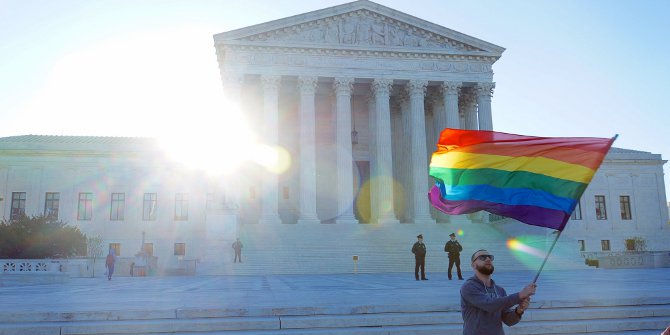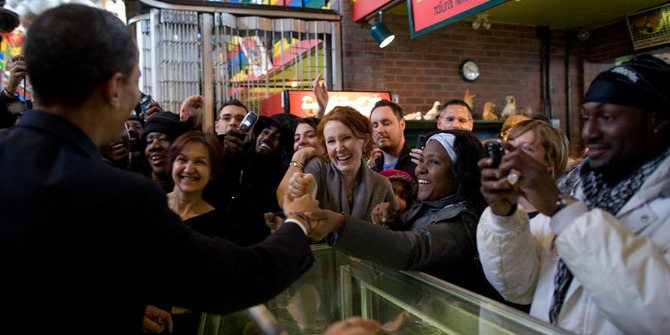


 As we approach the 2024 presidential election, there is rising concern over misinformation about candidates and the electoral contest. But why do some voters support factually inaccurate statements? In new research, Minjae Kim, Oliver Hahl, Ethan Poskanzer, and Ezra Zuckerman Sivan find that voters often defend factually incorrect claims made by politicians that they support by framing them as expressions of a deeper truth about a perceived moral wrong. They write that these voters can justify factually incorrect statements on the grounds that they serve a higher moral or political purpose.
As we approach the 2024 presidential election, there is rising concern over misinformation about candidates and the electoral contest. But why do some voters support factually inaccurate statements? In new research, Minjae Kim, Oliver Hahl, Ethan Poskanzer, and Ezra Zuckerman Sivan find that voters often defend factually incorrect claims made by politicians that they support by framing them as expressions of a deeper truth about a perceived moral wrong. They write that these voters can justify factually incorrect statements on the grounds that they serve a higher moral or political purpose.
“[T]here are times when it is more important for a leader to send the right message, even if it is not entirely accurate.” This statement from a Democratic respondent in one of our studies regarding Joe Biden’s factually incorrect statement about COVID-19 vaccination encapsulates a troubling trend in American politics. In recent years, voters from both major parties seem increasingly willing to accept, and even defend, misinformation from their political leaders. Our new research delves into this phenomenon, revealing how voters justify factually incorrect statements based ondeeper, morally charged “truths.”
The dilemma of fact vs. truth
Prevailing theories on misinformation suggest that voters support factually inaccurate statements because they are “fooled” into thinking those statements are factually correct. Our research, conducted through a series of online surveys during and after the Trump administration, suggests a more complex picture. We begin by rejecting the premise that voters, whether Republican or Democratic, support politicians who share misinformation simply because they mistakenly accept factual inaccuracies as factually correct. Instead, we found that voters often defend “their” politicians’ factually incorrect claims by framing them as expressions of a deeper truth. This is what we term “moral flexibility”: the idea that voters will call out any opposition party members when they are factually inaccurate but recognize and accept misinformation from their own party’s candidates as representing a deeper truth.
Justifying falsehoods based on a higher moral purpose
For instance, during the 2020 presidential election, Trump supporters vigorously defended his factually inaccurate claims about a rigged election. Those claims were often presented as factual statements, such as “Over 10,300 ballots in Georgia were cast by individuals whose names and dates of birth match Georgia residents who died in 2020 and prior to the election” or that “In the State of Arizona, over 36,000 ballots were illegally cast by non-citizens.” Our studies show that Trump supporters’ endorsement of these claims wasn’t merely due to a failure to distinguish fact from fiction, even though some of such tendencies did exist. But more profoundly, many voters viewed Trump’s assertions as conveying a broader, more important truth about their perceived political and social grievances; and endorsed them, despite recognizing their factual inaccuracies.
Our research thus distinguishes between two critical forms of flexibility among voters: factual and moral. Factual flexibility involves interpreting factually inaccurate information as factually correct, often driven either by partisan bias or cognitive laziness. Moral flexibility, however, goes a step further. It entails justifying factually incorrect statements—that they explicitly recognize as factually incorrect—on the grounds that they serve a higher moral or political purpose.

Photo by The Climate Reality Project on Unsplash
How voters justify falsehoods
We conducted six studies to investigate this phenomenon, five during Trump’s presidency and one in 2023. These studies involved presenting participants with statements from politicians that they were told flagrantly violated the norm of fact-grounding. The results consistently showed that voters often condoned and even supported these violations, justifying them morally rather than factually.
Key to our analyses was the comparison of two questions. First, we asked participants to evaluate the extent to which a statement in question is “true.” Supporters of the politician were significantly more likely to say that the statement was “true” than they were willing to say that it was “based on objective evidence.” The distinction between these two outcomes highlights the divorce between two concepts that media, scholars, and societies have long assumed to be synonymous. Second, we asked participants to evaluate which criterion was more important: whether “the statement should be based on objective evidence” or “that it should send the right message about American priorities.” Supporters of a partisan speaker, whether Republican or Democratic, were more likely to choose the latter over the former, thereby exhibiting lower commitment to factual accuracy for their own party’s politician. By contrast, when evaluating a politician from the opposing party the participants were more likely to choose the former statement (“the statement should be based on objective evidence”). In this way, participants consistently displayed “moral flexibility” by morally justifying misinformation when it came from their own partisan side, but prioritizing facts when evaluating a statement of misinformation from the opposite-partisan politician.
Strikingly, our study shows that Trump’s claims about the 2020 election also serves as a case of this phenomenon. Despite overwhelming evidence to the contrary, many Trump supporters often maintain that the 2020 Presidential election was “stolen” or “rigged.” These supporters are often portrayed in the media as believing the factual basis of that claim. However, our study shows that many justify their belief not based on objective evidence, but also because they feel the claim captured a deeper truth about a moral wrong: their perceived disenfranchisement.
Our studies reveal that Democrats, too, display moral flexibility when evaluating factually incorrect statements from their own leaders, such as President Joe Biden and New York US House Representative Alexandria Ocasio-Cortez, suggesting that this is a broader phenomenon in contemporary American partisan politics.
Implications for democracy
Our findings challenge the assumption that misinformation can be effectively countered merely by educating voters to distinguish fact from fiction. Our research indicates that voters’ support for misinformation is deeply rooted in their moral-political orientations.
While we focus on the diagnosis of the problem, efforts to combat political misinformation must address the moral dimensions of voters’ beliefs. This may involve recognizing that voters may prioritize moral resonance over factual accuracy when evaluating political statements. Simply put, fact-checking alone is not enough. There needs to be a concerted effort to engage with and understand the underlying moral narratives that drive voter support for misinformation.
Our research underscores a critical feature of contemporary democracies: the commitment to democratic norms, including the norm of fact-grounding, cannot be taken for granted. In an era where moral and partisan divides run deep, voters may prefer fact-flouting statements that align with their moral views over fact-based discourse. This presents a significant challenge for maintaining a political system grounded in objective evidence. Unless there is a political climate that values both factual accuracy and a deeper understanding of the moral underpinnings of political beliefs, the problem of political misinformation may persist.
- This article is based on the paper, ‘When Truth Trumps Facts: Studies on Partisan Moral Flexibility in American Politics’, in the American Journal of Sociology.
- Please read our comments policy before commenting.
- Note: This article gives the views of the author, and not the position of USAPP – American Politics and Policy, nor the London School of Economics.
- Shortened URL for this post: https://wp.me/p3I2YF-e0R






